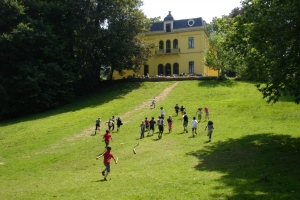LAP MEDIA & FILMS
Kristi M. Wilson | Media & Film Section Co-Editor at Latin American Perspectives
“Sin imágenes propias, no existe la posibilidad de dar vida plena al imaginario de cada individuo” Octavio Getino
“Without our own images, it is not possible to give full life to the imaginary of each individual?”
Octavio Getino
Gender, Sexuality, Film, and Media in Latin America: Challenging Representation and Structures
March 2021
Issue Editors: Kristi M. Wilson and Clara Garavelli
This special issue of LAP engages the often under-recognized role of Latin American women and queer film/video-makers, as well as the cultural impact of gender and sexuality norms on film and other media. Contributors in this issue explore what it means to gaze back (cinematically) at Latin American history. The essays address such themes as: increasing inequality, environmental degradation, decoloniality, indigeneity, activism, gender politics and queer narratives.
![]()
TABLE OF CONTENTS | PURCHASE THIS ISSUE
[/fusion_builder_column][/fusion_builder_row][/fusion_builder_container]
ROMA
ROMA (film dossier)
2018 drama film written and directed by Alfonso Cuarón
World-famous director Alfonso Cuarón’s film Roma, which recently won the Golden Globe for Best Picture and is nominated in 10 Academy Award categories, shines a light on a figure who is often invisible: the domestic worker. Called empleada, muchacha, chica, and worse, these workers, ubiquitous in Latin American cities , labor in conditions of exploitation that are not seen in other occupations.
According to the International Labor Organization (ILO), nearly 30% of domestic workers in the world are explicitly excluded from national labor laws. Even when they do have rights guaranteed by law, these are not usually enforced. Latin America is home to 27% of the world’s domestic workers, and in recent years, several Latin American films have addressed the situation of […]
Solutions from Below (film review)
Pedagogical Documentaries and Praxis
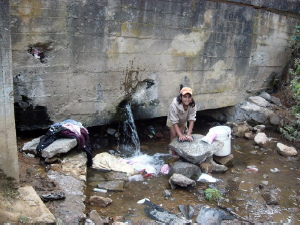 By: Kristi M. Wilson and Tomás Crowder-Taraborrelli
By: Kristi M. Wilson and Tomás Crowder-Taraborrelli
Alejandro Ramírez Anderson Tierralismo: Stories from a Cooperative Farm, 2013. José Cohen H2Omx, 2013.
En este valle verdusco, antes corrían ríos rutilantes, cenizos, castaños y cárdenos, púrpuras, perdidos y pardos; quebrajosos, vocingleros, berreando bajaban de la mon-taña humeante, salían a los llanos lerdos, tentaban a la temprana Tenochtitlán. Hoy van mugiendo entubados, menguados, pesados de aguas negras, crecidos de mierda; ríos sin riberas, risibles, con riendas, rabiosos, rabones, ruidosos de coches; avanzando a tumbos por la ciudad desflorada, desembocando en los lagos letales, y en el marcado mar, que ya no los ama.
—Homero Aridjis
Part of the rich documentary film tradition includes pedagogical films. The best of these documentaries successfully incorporate the strange combination of artistic and pedagogical innovation in their efforts to educate and encourage audiences […]
You Never Know What You Are Filming (film review)
Art, Mentorship, and States of Siege
 By: Kristi M. Wilson
By: Kristi M. Wilson
Miguel Ángel Vidaurre Marker ’72: Cartography of a Faceless Filmmaker. Chile, 2012.
Marker ’72: Cartography of a Faceless Filmmaker, produced by Factoría Espectra, is an essay-style documentary about the groundbreaking French filmmaker Chris Marker’s encounter with Salvador Allende’s Chile in 1972, his subse-quent mentorship of Chilean director Patricio Guzmán (The Battle of Chile), and his impact on the Chilean film community after the military coup of 1973. A legendary recluse and the director of enigmatic film classics such as La Jetée (1962), A Grin Without a Cat (1977), Sans Soleil (1983), and AK (1985), Marker arrived in Chile as part of the production team for the filming of Costa-Gavras’s political thriller State of Siege. According to Guzmán, in spite of the fact that State of Siege turned […]
Children of the Diaspora: For Peace and Democracy (featured film)
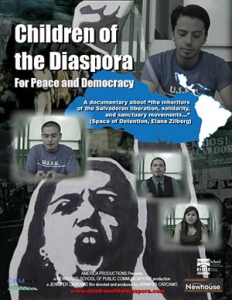 Children of the Diaspora: For Peace and Democracy (2013), a film directed by Jennifer Cárcamo and produced with the support of the Centro de la Memoria Histórica Salvadoreña, documents the journey of a group of university students from California to El Salvador, the homeland of their parents and for some of them their own birthplace. The students are members of the Unión Salvadoreña de Estudiantes Universitarios, a transnational organization committed to political consciousness-raising among Salvadoran youth. The film documents the group’s trip to El Salvador as part of a delegation invited to observe the 2009 presidential campaign. This election, in which Mauricio Funes won the presidency, would turn out to be historical because, for the first time, a member of the Frente Farabundo Martí para la Liberación Nacional won the office. The opening sequence of the film, set to Silvio Rodriguez’s “Sueño con Serpientes,” makes the goals of Cárcamo’s project clear: to gather […]
Children of the Diaspora: For Peace and Democracy (2013), a film directed by Jennifer Cárcamo and produced with the support of the Centro de la Memoria Histórica Salvadoreña, documents the journey of a group of university students from California to El Salvador, the homeland of their parents and for some of them their own birthplace. The students are members of the Unión Salvadoreña de Estudiantes Universitarios, a transnational organization committed to political consciousness-raising among Salvadoran youth. The film documents the group’s trip to El Salvador as part of a delegation invited to observe the 2009 presidential campaign. This election, in which Mauricio Funes won the presidency, would turn out to be historical because, for the first time, a member of the Frente Farabundo Martí para la Liberación Nacional won the office. The opening sequence of the film, set to Silvio Rodriguez’s “Sueño con Serpientes,” makes the goals of Cárcamo’s project clear: to gather […]
Force and Meaning Political Hauntings in Two Contemporary Brazilian Films (film review)
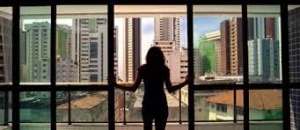 By: Kristi M. Wilson
By: Kristi M. Wilson
According to Avery Gordon, sociological hauntings can take a range of forms, from lost personal artifacts to decaying archival material to people living in the wake of dispossession and repression. Two Brazilian films from 2012, Neighboring Sounds/O som ao redor, a fiction film directed by Kleber Mendonça Filho, and Elena, a documentary directed by Petra Costa, explore this idea of hauntings from different moments of the political past: colonialism and the last dictatorship, respectively. They represent collisions between the force of the past and its meaning in the present across a range of Brazilian chronoscapes—historical changes and recurrences that impact race, gender, and class relations and speak to the widening chasm of social inequality, continually reinventing itself for the times. Neighboring Sounds was featured at the 2013 Latin American Studies Association […]
El edificio de los Chilenos (featured film)
Macarena Aguiló’s debut documentary The Chilean Building (Magic Lantern Films, 2010) takes up an often neglected aspect of the organized struggles against the Pinochet dictatorship. The film reminds us that when young militants went underground to organize armed resistance, they made enormous sacrifices to protect their children (often targets of the repression) that sometimes entailed a radical challenge to their roles as parents.
Aguiló tells the story of a group of more than 60 children who were put in the care of surrogate parents, first in Europe and then in Cuba. The biological parents belonged to the same political organization, the MIR (Movimiento de Izquierda Revolucionario), and, as the film discloses, had lengthy debates about the pros and cons of leaving their children temporarily while they carried on the struggle.
The film interviews reveal profound meditations on familial responsibilities and political commitment and thoughts about […]
The Outsiders Pathways of Migratory Experience in Latin American Films (film review)
In the past several decades the theme of migration has continually recurred in the cinema of and about Latin America, and it is not difficult to see why it is a popular topic in a region characterized by rapid upheavals in political, economic, and cultural circumstances.
In the midst of flux and change, movement is transformed into something
more than an urgent necessity. It is a reflex; it becomes one of the few ways that one can
make sense of the ever-shifting world. Indeed, we can even speak of the aesthetics of
migration itself and suggest that cinema is well suited to depicting and contemplating
that experience of traversal within and across national borders; the medium is capable
of capturing grand vistas and broad swaths of space and time, along with attending to
the minute details of daily life and daily struggle.
The more familiar manifestations of this theme come with the cycle of films, almost
a […]
Migration, Regional Traditions, and the Intricacy of Documentary Representation in Cuates de Australia and La chica del sur (film review)

By: Tomás Crowder-Taraborrelli
Approaches to telling a story are, of course, abundant. Latin American filmmakers borrow from all kinds of artistic traditions—literature, pop music, the plastic arts, home movies, etc. What makes this borrowing both draining and stimulating is that the web offers an excess of examples to draw from. Further, digital production and online distribution are cultivating a new kinship among filmmakers, visual traditions, and viewers across the world. This is a daunting realization that the current crop of young filmmakers is trying to grapple with. Two recent documentary films from Mexico and Argentina bring the topic of social and cultural migration into focus, giving international audiences the opportunity to enter otherwise inaccessible worlds. Cuates de Australia (Drought) from Mexico and La chica del sur (The Girl from the South) from Argentina display contrasting approaches to portraying the hardships of relocation.
Both documentaries follow their protagonists’ journeys from the place they […]
Homo artis, Homo laborans, and Homo politicus – The Pursuit of Redemption in Three Recent Argentine Films (film review)
 By: Tomás Crowder-Taraborrelli
By: Tomás Crowder-Taraborrelli
One cannot be short of themes while there is still plenty of reality. Any hour of the day, any place, any person, is a subject for narrative if the narrator is capable of observing and illuminating all these collective elements by exploring their interior value.
—Cesare Zavattini
Armando Bo’s feature film debut The Last Elvis (El último Elvis) is a refreshing addition to recent Argentine releases. Bo is the grandson of Armando Bo Senior, the director of the soft-porn pulp classics of Isabel “La Coca” Sarli (Fiebre, 1972, and Carne, 1968). He appears to share his grandfather’s fascination with the malcontent antiheroes that are ever present in our bustling Latin American cities. The Last Elvis follows the misadventures of Carlos Gutiérrez (John McInerny) over a period of a few days. Carlos makes his living impersonating Elvis Presley, singing at private parties […]
Disappearing into the Distance Two Latin American City Symphonies (film review)
 By: Kristi M. Wilson
By: Kristi M. Wilson
In Oblivion, the award-winning Dutch-Peruvian filmmaker Heddy Honigmann (Forever, Metal and Melancholy, O Amor Natural) visits her birthplace to record the stories of everyday Peruvians under Alan García’s second presidency (2006–2011). Her camera appears to float or wander at the street level, pausing on occasion to drop in upon the lives of the people it encounters there. Andrea Prates and Cleisson Vidal’s Dino Cazzola is at once a family history, a story of migration, a story of power and national identity, and an homage to filmmaking. Both films recall the Russian director Dziga Vertov’s 1929 classic documentary Man with a Movie Camera in that they are city symphonies, films that produce complex truths about a particular urban space by weaving together images and narrative fragments from the lives of its longtime residents.
At the start of Dino Cazzola: A Filmography […]
On the Decay of the Art of Going to the Movies (film review)
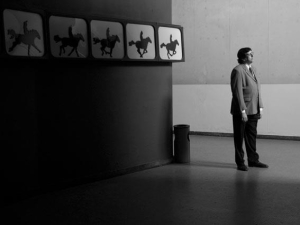 By: Oscar Moralde
By: Oscar Moralde
By: Kristi M. Wilson
In their imaginations they saw the cinema as a total and complete representation of reality; they saw in a trice the reconstruction of a perfect illusion of the outside world in sound, color, and relief.
—Andre Bazin
It is in the nature of analogical worlds to provoke a yearning for the past. . . . The digital will wants to change the world.
—D. N. Rodowick
La vida útil is simultaneously a cinephile’s dream picture, in its stylized look back at the history of cinema, and a biting satire about the fact that in the digital age of reproduction even the art of filmmaking has lost its aura. Uruguayan film buffs will recognize the film enthusiast and regular film festival patron Jorge Jellinek as the film’s central protagonist, Jorge, and the legendary film critic and real-life Cinemateca director Manuel Martínez Carril as a version of himself. Veiroj’s film […]
Latin American Dreaming (film review)
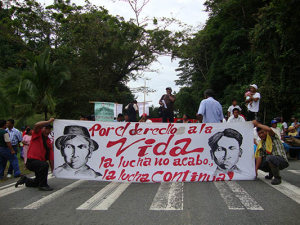 By: Kristi M. Wilson and Tomás Crowder-Taraborrelli
By: Kristi M. Wilson and Tomás Crowder-Taraborrelli
Paraíso for Sale, directed by Anayansi Prado (also the director of Maid in America, 2005, and Children in No Man’s Land, 2008), treats the topic of Canadian and American retirees’ looking to stretch their dollars, buy second homes, and unwind in the sun by relocating (often permanently) to the Caribbean. It presents ample evidence of the looting of prime real estate in the Caribbean, where international corporations disembark with billions of dollars, pressure the locals to sell their land, and entice politicians not to enforce the law or, worse, to break it. The film’s voice-over narration suggests that this residential tourism invasion is an extension of earlier incursions from the North: “The U.S. has invaded Panama before with its armies. This invasion comes armed with golf clubs and dreams of an idyllic American retirement.” The few courageous locals who, for moral or practical reasons, resist the […]
Corazón de fábrica Heart of the Factory (featured film)
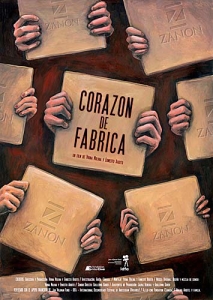 Despite the widespread perception of a turnaround in the Argentine economy in recent years and the institutionalization of popular movements, an ongoing workers’ struggle to lift local factories out of bankruptcy continues to inspire sectors of the Argentine population. Virna Molina and Ernesto Ardito’s Corazón de fábrica (Heart of the Factory, 2008) is not only a revealing account of workers’ reactions to the economic meltdown of 2001 but a multifaceted meditation on the political principles involved in the reorganization of a ceramic factory in the southern province of Neuquén. Corazón de fábrica attests to the pernicious impact that neoliberal policies have had on Argentine families, affecting every aspect of their lives: education, health, transportation, and, primarily, employment.
Despite the widespread perception of a turnaround in the Argentine economy in recent years and the institutionalization of popular movements, an ongoing workers’ struggle to lift local factories out of bankruptcy continues to inspire sectors of the Argentine population. Virna Molina and Ernesto Ardito’s Corazón de fábrica (Heart of the Factory, 2008) is not only a revealing account of workers’ reactions to the economic meltdown of 2001 but a multifaceted meditation on the political principles involved in the reorganization of a ceramic factory in the southern province of Neuquén. Corazón de fábrica attests to the pernicious impact that neoliberal policies have had on Argentine families, affecting every aspect of their lives: education, health, transportation, and, primarily, employment.
The film centers on a popular uprising of workers at the privately owned Zanón ceramic tile factory who resisted eviction when the factory closed its doors in the midst of the economic crisis. The workers appropriated the […]



